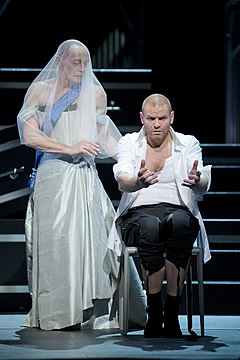
Béatrice et Bénédict is an opéra comique in two acts by French composer Hector Berlioz. Berlioz wrote the French libretto himself, based in general outline on a subplot in Shakespeare's Much Ado About Nothing.

Dietrich Fischer-Dieskau was a German lyric baritone and conductor of classical music. One of the most famous Lieder performers of the post-war period, he is best known as a singer of Franz Schubert's Lieder, particularly "Winterreise" of which his recordings with accompanists Gerald Moore and Jörg Demus are still critically acclaimed half a century after their release.

Mathis der Maler is an opera by Paul Hindemith. The work's protagonist, Matthias Grünewald, was a historical figure who flourished during the Reformation, and whose art, in particular the Isenheim Altarpiece, inspired many creative figures in the early 20th century.
Júlia Várady is a Hungarian-born German soprano who started out as a mezzo-soprano.
Harry Alfred Robert Kupfer was a German opera director and academic. A long-time director at the Komische Oper Berlin, he worked at major opera houses and at festivals internationally. Trained by Walter Felsenstein, he worked in the tradition of realistic directing. At the Bayreuth Festival, he staged Wagner's Der fliegende Holländer in 1978 and Der Ring des Nibelungen in 1988. At the Salzburg Festival, he directed the premiere of Penderecki's Die schwarze Maske in 1986 and Der Rosenkavalier by Richard Strauss in 2014.

The National Theatre on Max-Joseph-Platz in Munich, Germany, is a historic opera house, home of the Bavarian State Opera, Bavarian State Orchestra and the Bavarian State Ballet.

Aribert Reimann is a German composer, pianist and accompanist, known especially for his literary operas. His version of Shakespeare's King Lear, the opera Lear, was written at the suggestion of Dietrich Fischer-Dieskau, who sang the title role. His opera Medea after Grillparzer's play premiered in 2010 at the Vienna State Opera. He was a professor of contemporary Lied in Hamburg and Berlin. In 2011, he was awarded the Ernst von Siemens Music Prize for his life's work.
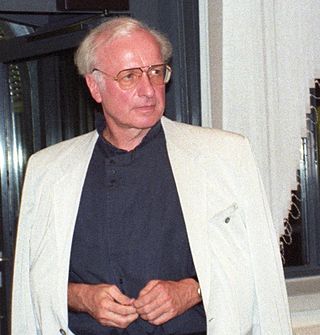
Gerd Albrecht was a German conductor.

The Bassarids is an opera in one act and an intermezzo, with music by Hans Werner Henze to an English libretto by W. H. Auden and Chester Kallman, after Euripides's The Bacchae.
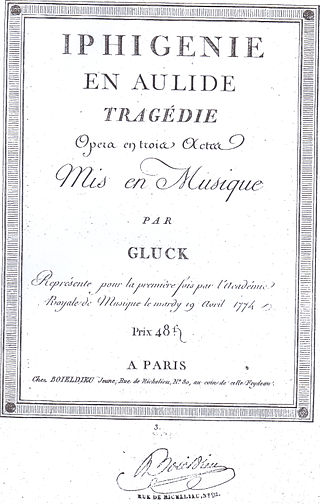
Iphigénie en Aulide is an opera in three acts by Christoph Willibald Gluck, the first work he wrote for the Paris stage. The libretto was written by François-Louis Gand Le Bland Du Roullet and was based on Jean Racine's tragedy Iphigénie, itself based on the play Iphigenia in Aulis by Euripides. It was premiered on 19 April 1774 by the Paris Opéra in the second Salle du Palais-Royal and revived in a slightly revised version the following year.
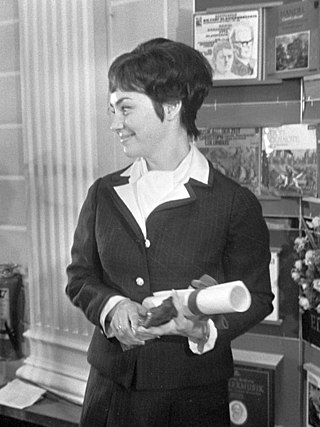
Edith Mathis is a Swiss soprano and a leading exponent of the works of Wolfgang Amadeus Mozart worldwide. She is known for parts in Mozart operas, but also took part in premieres of operas such as Henze's Der junge Lord.

Doktor Faust is an opera by Ferruccio Busoni with a German libretto by the composer, based on the myth of Faust. Busoni worked on the opera, which he intended as his masterpiece, between 1916 and 1924, but it was still incomplete at the time of his death. His pupil Philipp Jarnach finished it. More recently, in 1982, Antony Beaumont completed the opera using sketches by Busoni that were previously thought to have been lost. Nancy Chamness published an analysis of the libretto to Doktor Faust and a comparison with Goethe's version.

Palestrina is an opera by the German composer Hans Pfitzner, first performed in 1917. The composer referred to it as a Musikalische Legende, and wrote the libretto himself, based on a legend about the Renaissance musician Giovanni Pierluigi da Palestrina, who saves the art of contrapuntal music (polyphony) for the Church in the sixteenth century through his composition of the Missa Papae Marcelli. The wider context is that of the European Reformation and the role of music in relation to it. The character of Cardinal Borromeo is depicted, and a General Congress of the Council of Trent is the centrepiece of act 2.
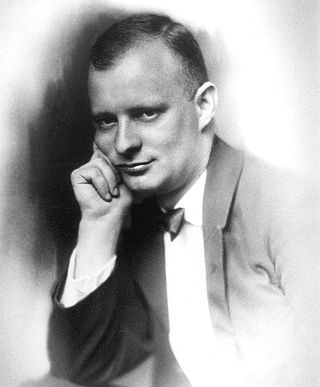
Cardillac, Op. 39, is an opera by Paul Hindemith in three acts and four scenes. Ferdinand Lion wrote the libretto based on characters from the short story Das Fräulein von Scuderi by E. T. A. Hoffmann.

Ortrun Wenkel is a German operatic contralto. She notably portrayed the role of Erda in the Bayreuth Jahrhundertring in 1976 and was awarded a Grammy Award as a Principal Soloist in 1983.

Die Gezeichneten is an opera in three acts by Franz Schreker with a German-language libretto by the composer, based on Frank Wedekind's play Hidalla.
Der Sturm is a German-language opera in three acts and an epilogue by the Swiss composer Frank Martin to a libretto based on the Schlegel/Tieck German translation of Shakespeare's The Tempest.
Claudia Barainsky is a German operatic soprano. She has performed internationally, and won awards for her roles in contemporary operas such as Bernd Alois Zimmermann's Die Soldaten and Aribert Reimann's Medea.
Claus H. Henneberg was a German librettist and translator. He worked as dramaturge for the Cologne Opera and the Deutsche Oper Berlin. In the 1976/77 season, he was the Intendant of the Opernhaus Kiel.
Hans Günter Nöcker was a German operatic bass-baritone who was based at the Bavarian State Opera for decades, performing in several world premieres including Aribert Reimann's Lear, and also had an international career.
